I loved the mix of career, relationships and most importantly friendship. Despite this, I only came across a singular, one dimensional representation of females. Sex and the City, Friends and the L Word all portrayed the female experience, but, they all lacked diversity. Yes, I remember being entertained but they I rarely developed an emotional connection. I just could not relate.
Brown Girls is an antidote to one-tier female representation. The series is focused on the friendship shared by an African American named Patricia and a Pakistani American Muslim called Leila. Several topics such as visibility, exoticism and racism are tackled. Tanya Vasundharan points out the emphasis on characters doing “regular things” such as “getting drunk, sending men home in Ubers after sex, dealing with heartbreak and parents divorcing”. The mundane portrayal of character that are regularly “other-ed” debunks the stereotypes of marginalised ethnicities. Yes, these characters should be perceived as intersectional, but they should also be recognised as ordinary people. They are not a threat and they certainly aren’t exotic.
Similarly, Asghar comments “Leila is the type of Muslim woman who isn’t shown a lot on TV, and in some ways how she expresses her identity might make people uncomfortable because it resists the stereotypes — she’s queer, she drinks, she ends up fighting someone at a party. She lives a lifestyle that is not often shown but I think is very real”.
Similarly, Sam Bailey declares that he is interested in diverse characters that are not “vessels for pain”. The experiences of people of colour are “trauma porn”. Yes, these people experience happiness and they “are people that we know.”

![5 Reasons You Should Travel Alone Airplane [image source: chau nguyen/ http://thedevilhatessweatpants.blogspot.com.au ], crowd ink, crowdink, crowdink.com, crowdink.com.au](https://crowdink.com/wp-content/uploads/2016/08/Chau-airplane-218x150.jpg)




























![5 Reasons You Should Travel Alone Airplane [image source: chau nguyen/ http://thedevilhatessweatpants.blogspot.com.au ], crowd ink, crowdink, crowdink.com, crowdink.com.au](https://crowdink.com/wp-content/uploads/2016/08/Chau-airplane-100x70.jpg)


